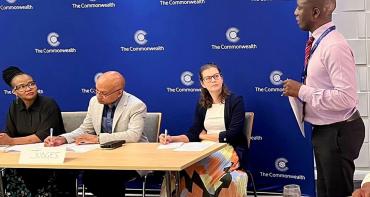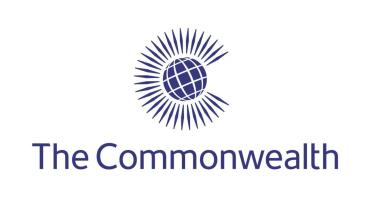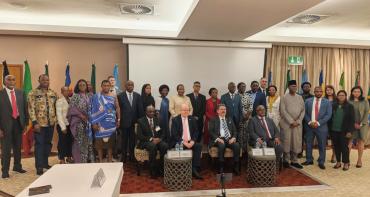Theme: ‘Effective Solutions to Commonwealth Developmental Challenges’

Honourable speakers and parliamentarians, distinguished guests, Commonwealth friends…
It is a pleasure to address you again, and I thank Sir Alan Haselhurst and Dr William Shija for inviting me to do so. This is a regular fixture in my calendar and I always welcome the opportunity to meet with those who represent the people of the Commonwealth through our parliaments, where the heart of democracy beats strongest.
We also owe gratitude to our hosts, Hon. Mninwa Johannes Mahlangu and Hon. Max Sisulu. I congratulate them and their teams on the excellent arrangements for this conference, and thank them for the warm welcome we have received.
Wherever I travel in member states, I make a point of calling on leaders and representatives of the government as well as on the Speaker and Leader of the Opposition. I am always mindful of the role that parliamentarians play, and the importance of strengthening parliamentary practice and culture. I would have met a number of you here in the course of those visits, and it is very good to see familiar faces.
A Commonwealth conference in Africa is also always an opportunity to take stock and to celebrate that our members here, across the range of indices, tend to find themselves at the top end of progression and achievement. This is not by chance. The Commonwealth has identified a blend of values and principles that are advanced for its people. And a great deal of the success in this region as elsewhere is due to the role of yourselves as parliamentarians.
Commonwealth bonds with South Africa
South Africa’s place in the Commonwealth, and the Commonwealth’s role in the struggle against apartheid, remind us that shared belief in democracy, development, and respect for diversity, are what bind our global family together.
This morning, His Excellency the President lauded the Commonwealth as a uniquely global organisation.
Nelson Mandela – Madiba – South Africa’s greatest son whom we all wish well, speaking as the first democratically elected leader of this ‘Rainbow Nation’, famously remarked that, ‘the Commonwealth makes the world safe for diversity’.
Representation and respect for diversity and for differing opinions, with inclusivity and equity, are indispensable to our Commonwealth understanding of what is needed if we are to take strides as societies that are more just, and a world order that is morefair.
The commitment of our member states to representative parliamentary democracy can be seen as an expression of the kinship and affinity that is so distinctive a feature of the Commonwealth. Indeed, parliamentary links, forged and continually strengthened through the work of the Commonwealth Parliamentary Association over many decades, can be seen as among the most powerful practical illustration of Commonwealth nations joining together freely and voluntarily in an enduring relationship.
Democracy around the Commonwealth takes varied forms. However, we commit ourselves to common values and principles, and these shape both our collective goals and our collective responsibility. Deep-rooted in our Commonwealth approach is the ideal of learning from one another and gaining reciprocally through the exchange of ideas, experience and insights.
That is what Commonwealth conferences are all about: to strengthen networks, to share, to exchange, to be mutually supportive, and to benefit from doing so.
Democracy and Development
The collective wisdom of the Commonwealth is that, while development and democracy are each goals in their own right, they are also interconnected and mutually reinforcing. Development is enhanced and achieves greater advance in democratic societies where the individual has liberty and choice. Democracy is enhanced where the tide of economic growth lifts all and leaves none behind.
The Commonwealth Heads of Government meeting in Abuja in 2002 said in the Aso Rock Declaration on Development and Democracy, ‘We are convinced that broad-based prosperity creates the stability conducive to the promotion of democracy; and that strong democratic institutions better promote development’.
It is therefore most appropriate that, as parliamentarians, your conference theme should be, ‘Effective Solutions to Commonwealth Developmental Challenges’. It also reflects the theme chosen for this year’s Commonwealth Heads of Government Meeting (CHOGM) in Sri Lanka, ‘Growth with Equity: Inclusive Development’. Our ambition for the CHOGM in November is that leaders will explore how growth and development can be advanced whether one lives in a city, a town, a village, a rural community, or an out-lying island.
We do well to recall the objectives identified already by our heads as those they consider make democracy work for pro-poor development.
These include:
• a participatory democracy characterised by free and fair elections and representative legislatures;
• an independent judiciary;
• a well-trained public service;
• a transparent and accountable public accounts system;
• machinery to protect human rights;
• the right to information;
• active participation of civil society, including women and youth;
• substantially increased and more effective financial resources; and
• increased democracy at the global level, including enhanced participation and transparency in international institutions.
MDGs and post-2015 sustainable development framework
These objectives remain relevant and topical, particularly as we approach the target date for the Millennium Development Goals in 2015. While substantial headway has been made, both globally and in the Commonwealth, a long road still lies ahead.
Particular challenges remain in meeting targets on basic education, maternal mortality, hunger and gender equality. The final global push is being led by two Commonwealth countries, Australia and Rwanda, as co-chairs of the Millennium Development Goal Advocacy Group convened by the UN Secretary-General.
As we assess progress and measure achievements, work towards international convergence on a post-2015 sustainable development framework is already underway. The UK Prime Minister was one of three leaders who co-chaired the UN Secretary-General’s high-level panel which has now issued its report on the framework. South Africa and Ireland have been contributing at another level.
The Commonwealth has a long record of building consensus around global challenges, and is well-placed to provide both analytical and practical insights into this debate.
Indeed, the new global development agenda has featured prominently at recent Commonwealth ministerial meetings. Last year’s Commonwealth Education Ministers Meeting in Mauritius set up a Working Group to define Commonwealth development priorities for education post-2015. Meetings earlier this year of Commonwealth Ministers of Health, Youth, Women’s Affairs, and Environment have also considered how our combined efforts can best be directed to promote a robust, sustainable and effective global approach to development. A common thread, reflecting our focus on the practical and on delivery, is that our various ministerial discussions have pointed to the importance both of reaching global agreement on new goals themselves as well as on the means by which they can be achieved.
All in all, the Commonwealth is bringing its perspective to the debate on the new post-MDGs global development agenda.
Commonwealth values
As representatives of the people, I can think of no more important an audience than this one to which to comment on our new Charter, also alluded to by His Excellency the President this morning. The values and aspirations for which the Commonwealth strives have been brought together in a single, accessible document, adopted by Heads of Government in December last year, and signed on Commonwealth Day this year by Her Majesty The Queen, Head of the Commonwealth. We now have a defining document for our association, to which the people of the Commonwealth at large contributed and which embodies their goals and expectations.
I welcome your support in raising awareness of the Charter. I trust opportunities can be found to debate it in parliaments, and to use it as an aid in encouraging greater partnership and collective striving.
Of particular relevance, given the theme for this conference, is Article 2 of the Charter in which our governments and peoples collectively declare, ‘We are committed to equality and respect for the protection and promotion of civil, political, economic, social and cultural rights, including the right to development, for all without discrimination on any grounds as the foundations of peaceful, just and stable societies’.
The Charter also goes on to say, under the heading ‘Separation of Powers’: ‘We recognise the importance of maintaining the integrity of the roles of the legislature, executive and judiciary. These are the guarantors in their respective spheres of the rule of law, the promotion and protection of fundamental human rights and adherence to good governance’.
Human Rights – Universal Periodic Review
Given the role of the legislature, I should underline that the Commonwealth Secretariat much appreciates our practical partnership with the CPA, notably in delivering our human rights mandate. An important area of collaboration is strengthening the role of parliamentarians in one of the most important human rights mechanisms, the Universal Periodic Review.
At their request, we have worked to help build the capacity of parliamentarians, whose role is not formalised in the UPR process, so that they are equipped to carry forward accepted UPR recommendations.
A seminar we convened jointly last November, tailored to the needs of parliamentarians from Small Island Developing States, was designed to enhance the role of parliaments in the UPR reporting and implementation process, with members equipped to support the passage of legislation relevant to UPR recommendations.
In March this year we continued this with a Caribbean regional seminar in Trinidad and Tobago on the role of parliamentarians in the promotion and protection of human rights. One welcome outcome was the establishment of the Commonwealth Caribbean Parliamentary Human Rights Group.
The essential fact is that the contemporary UN structure for examining the human rights situation in any given member state can only benefit from an active role by parliamentarians. And we are happy to partner in this.
Election observation, electoral commissions & the Commonwealth Electoral Network
In this and other aspects of our work, a powerful Commonwealth advantage is our ability to forge partnerships between member states which, although from different corners of the globe, share much in common when it comes to institutional arrangements and legal frameworks. This enables us to offer one another support and allows fruitful cross-pollination of ideas.
It can be seen in action in the widely acknowledged aspect of the Commonwealth Secretariat’s work with and for parliamentarians – our role in convening and supporting election observer missions.
These teams of distinguished parliamentarians and other eminent Commonwealth personalities bring together knowledge and experience drawn from throughout the worldwide family of the Commonwealth.
In the period since 1990 we have sent more than 100 Observer Groups to presidential and parliamentary elections. These are highly valued by member states, which also see our observers as encouraging credence and legitimacy to the electoral process – and can also serve as a calming influence when tensions are high.
Over the past year we have observed elections in Lesotho, Papua New Guinea, Sierra Leone, Ghana, Kenya, Grenada and Pakistan. We have also received invitations to observe forthcoming elections in Maldives, Rwanda, Sri Lanka, Swaziland and Cameroon later this month.
The proper conduct of elections depends to a large extent on the capacity and resourcing of national election management bodies. The Commonwealth is committed to raising their performance so that they are a force for good, and upholders of the highest electoral standards. I have in the past referred to the Electoral Commission in any member state as the filament that must endure tremendous heat at election time. If and when it endures, the election result can enjoy credibility and support; when it breaks, the credibility of the election result is jeopardised.
With this in mind we have established a Commonwealth Electoral Network, bringing together election management bodies from across the Commonwealth. The Network is a new resource through which technical expertise in managing key processes of democracy can be exchanged. Our aim is to create peer-support mechanisms that promote good practices and sharing of experience to overcome common challenges.
The Network is one of the hundred or so communities of practice that now populate ‘Commonwealth Connects’, our secure cloud-based digital platform. This is all about the Commonwealth playing to its fundamental strength – its networks, its diversity, and its collective practical advancement – in both a contemporary twenty-first century way and the tested way of Commonwealth solidarity.
‘Commonwealth Connects’ will enable people to build interactive working partnerships using internet-enabled communication devices such as desktop/laptop computers or mobile smartphones. And it facilitates pan-Commonwealth collaboration across countries, organisations and partners. Information can be stored centrally and become accessible to any network member.
We are making this ground-breaking Commonwealth product available to all including the CPA. Our goal is that existing and future Commonwealth networks are not only informed and in touch with each other, but can also collaborate, transact, and forge creative partnerships online.
Government and opposition workshops
Honourable parliamentarians, the manner in which business is conducted once elected is as important for entrenching the culture of democracy as the process of election.
That is why the Commonwealth Secretariat has worked with the CPA for many years on regional ‘Government and Opposition workshops’. Both have valuable contributions to make in deepening the democratic process, through their respective rights, roles and responsibilities.
Our intention now is that these workshops should move from a regional focus and become more targeted and country oriented in approach. The aim is to consolidate the practice of a more constructive relationship between governing and opposition parties, conducive to their working more productively together in the joint interest of national harmony and national development.
Parliament is the primary forum where the voice of the people, especially the poor and marginalised has to be heard with absolute clarity. Confidence that parliament truly understands, and is able to address the aspirations and interests of the people, is a paramount guarantee of social peace and stability.
Such confidence is secured when parliamentarians – of both the majority and minority parties – show a common purpose in representing the interests and concerns of their electorate as a whole, when holding the Executive to account, and when improving and enacting legislation.
Distinguished Commonwealth parliamentarians, I conclude by paying tribute to your public service and duty, and in expressing respect for it. Your high calling, and your continuing care and commitment in the service of all, help ensure that in the world of tomorrow none are excluded from the life of the community in which they live, learn, and work, or are left behind in the onward march of social and material progress.
That is the noble purpose of our collective effort: to find inclusive and lasting solutions to Commonwealth development challenges, so that the fruits of prosperity and progress are shared, freely and with equity, by all our people and all nations.
Thank you again for your time and for the courtesy of inviting me.



